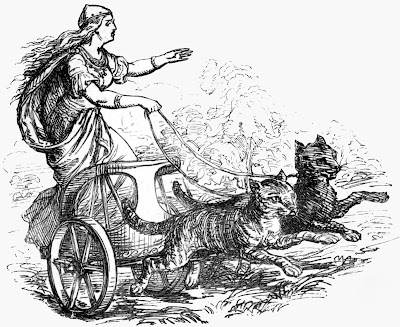But I'm going to start things off by tipping my hand a bit. I'm more a fan of grace than I am of legalism, so my feeling is that unless you're actually spending the day performing acts of worship for an ancient fertility goddess, you're probably OK. (It's similar to my feelings on Halloween, which you can read about here and here.) Now let's assess the case made against Easter:
 |
| Eostre, who has apparently mistimed her jump and is about to crush her tiny worshipers |
 |
| Freya, showing here a good use for cats that for some reason has fallen out of practice |
- Now, the historical argument: does the name "Easter" actually come from "Eostre"? Possibly, but there's plenty of room for doubt. The first suggestion of this comes from a great historian of the early-medieval church, the Venerable Bede, who throws Eostre out as a possible etymology. However, this association strikes a lot of historians as actually being pretty unlikely (and Bede, by his own admission, was sometimes fond of making guesses to fill in the gaps in his stories). Some make the case that a stronger association can be found in the early Germanic word for "east," which is very similar to "Easter" and "Eostre." Just as we still do today, ancient Christians often celebrated Easter Sunday with early-morning services oriented toward the rising sun (in fact, all churches used to be oriented toward the east simply as a matter of tradition and symbolism). If this latter theory is correct, then Easter got its name simply because it was the day that Christians got up early, faced east, and had a sunrise service.
 |
| Ishtar, tragically frozen in carbonite, Han Solo-style, for the past four thousand years |
 |
| Easter bunnies on their way to a nefarious pagan ritual |


